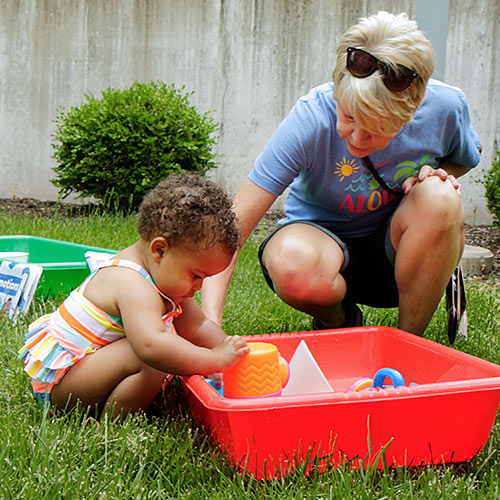 To a young child, every new experience is fascinating and surprising. Trying to see the world with the fresh eyes of childhood can help us turn mundane experiences into spur-of-the-moment learning opportunities.
To a young child, every new experience is fascinating and surprising. Trying to see the world with the fresh eyes of childhood can help us turn mundane experiences into spur-of-the-moment learning opportunities.
Staff from the children’s teams at all of our libraries offer parents and caregivers the following ideas on how to cultivate novel learning moments while you’re running errands or doing things around your home.
Letter Discovery
Words and letters are everywhere. When you’re riding in a car, walking or waiting in line, point out letters and words to your child or go on an alphabet hunt, starting with the letter “A.”
Benefit: Recognizing letters is a building block to reading, and street sign recognition helps your child understand that words have specific meanings.
The “Name It” Game
Name items as you are grocery shopping. Identify colors, shapes, numbers and other characteristics of your groceries. This activity can lead to fun and surprising questions from your little one, too.
Benefit: Your child will begin developing several school-readiness skills.
Synonym List-o-rama
When you’re holding a coffee mug and your child is clutching their sippy cup, list as many names as you can for things that hold water — bottle, cup, glass, tumbler, thermos, etc. Hats and bakery items are also fun to name.
Benefit: Build your child’s vocabulary.
Sing and Dance Along
Listening to music? Sing along! Or, clap the rhythm, tap on your child’s arm, bounce or dance with your child.
Benefit: Singing songs and moving to the rhythm helps your child hear the syllables and develop their language skills.
Everyday Play-by-Play
Kids learn from sun up to sun down, so describe what you’re doing throughout the day, regardless of how routine it is to you.
Benefit: Understanding how we sweep the floor and feed the pet builds self-sufficiency.
Nature Detective
As you go on a walk, point out animals and explain what they do. Worms turn leaves into compost; bees make honey; squirrels plant trees, etc. Or listen to the sounds around you and talk about what animals might be making them.
Benefit: Your child gets excited about the world around them and you’ll learn more about what interests them. You can pick up books at the library to feed those interests.
“I Spy” Matching Game
Look for things that are the same color, shape, or share other characteristics like flowers, letters, shiny, wheels, etc.
Benefit: Learning colors and putting like items together are important skills for preschoolers.
The Mini Mimic
Kids love to do whatever you’re doing, like cooking a meal. Feed that curiosity by creating a mini-kitchen out of boxes, and stock it with empty soup cans, cereal boxes, etc. (Tip: opening containers from the bottom makes them look unused.) Add a plastic bowl, a small pan and a spoon and the chef is ready to cook! Or, set up a kids mini-mart along the same lines.
Benefit: Kids begin learning life skills through realistic play.
Song Improv
Make up songs about your day and your routines. They can be silly and a fun way to talk about what to expect for the day. Bonus points for singing verses like an opera singer or a robot.
Benefit: Songs break down words in a beneficial way for young learners. Plus, this activity promotes creativity and gives a sense of ownership. It also helps children understand and adapt to structured activities.
As you can see, learning time doesn’t have to be limited to a formal classroom or a planned activity. There are opportunities everywhere around you to teach, learn, have fun and bond with your child.
